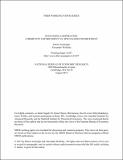Sustaining Cooperation: Community Enforcement versus Specialized Enforcement
Author(s)
Acemoglu, Daron; Wolitzky, Alexander
DownloadAccepted version (376.4Kb)
Terms of use
Metadata
Show full item recordAbstract
<jats:title>Abstract</jats:title>
<jats:p>We introduce the possibility of coercive punishment by specialized enforcers into a model of community enforcement. We assume that, just as regular agents need to be given incentives to cooperate with each other, specialized enforcers need to be given incentives to carry out costly punishments. We fully characterize optimal equilibria in the model. When the specialized enforcement technology is sufficiently effective, cooperation is best sustained by a “one-time enforcer punishment equilibrium”, where any deviation by a regular agent is punished only once, and only by enforcers. In contrast, enforcers themselves are disciplined (at least in part) by community enforcement. The reason why there is no community enforcement following deviations by regular agents is that such a response, by reducing future cooperation, would decrease the amount of punishment that enforcers are willing to impose on deviators. Conversely, when the specialized enforcement technology is less effective, optimal equilibria involve a mix of specialized enforcement and community enforcement (which might take the form of “ostracism”). Our results hold both under perfect monitoring of actions and under various types of private monitoring.</jats:p>
Date issued
2020Department
Massachusetts Institute of Technology. Department of EconomicsJournal
Journal of the European Economic Association
Publisher
Oxford University Press (OUP)